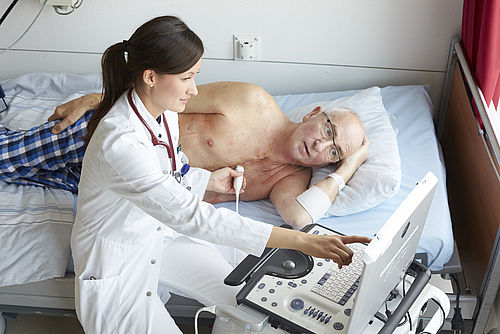Myocarditis - inflammation of the heart muscle

Myocarditis, or inflammation of the heart muscle, can affect people of any age, even those in good health. A viral infection usually causes it. The disease often progresses without typical symptoms, making it difficult for doctors to detect it. With consistent physical rest, the chances are good that myocarditis will heal without further consequences. Otherwise, there is a risk that it will trigger heart failure or cardiac arrhythmia and, in the worst case, lead to sudden cardiac death.
Disease description
It often begins with a harmless respiratory or gastrointestinal infection: if this is not properly cured, cells in the muscle tissue of the heart, the myocardium, can become inflamed. If the inflammation also spreads to the pericardium, this is called perimyocarditis.
Complaints such as tiredness, fatigue, aching limbs, fever, cough, and cold are usually attributed to the infection. The first signs of myocarditis are usually noticed a few weeks after an infection. If the fatigue lasts longer than usual with an infection or if other symptoms occur, these are serious indications of myocarditis and should be clarified by a doctor. Some signs, such as shortness of breath or water retention in the legs (oedema), are similar to those of heart failure. A feeling of tightness in the chest or chest pain (angina pectoris), pronounced palpitations, heart palpitations (arrhythmias), dizziness or fainting can also indicate myocarditis. Life-threatening cardiac arrhythmias can occur at any stage of the disease and can lead to sudden cardiac death.
An initially mild acute myocarditis can worsen or become chronic. Then there is a risk of permanent heart damage such as dilated cardiomyopathy with increasing cardiac insufficiency: the heart can no longer pump properly and patients feel weak and unable to perform. In patients who have heart failure and are younger than 40, myocarditis is the most common cause.
Some viruses reach the heart directly via the bloodstream, penetrate the heart muscle cells and trigger inflammation. In others, the inflammation is provoked indirectly, for example, by an excessive immune response of the body (cytokine storm).
Acute myocarditis can also lead to sudden cardiac death: Myocarditis is responsible for one in ten young people under 35 who die from sudden cardiac death. Children are rarely affected by myocarditis - but it is one of the most common causes of heart failure or cardiac insufficiency in childhood.
Causes
In western industrialised countries, heart muscle inflammation is mainly caused by viruses, for example, cold, flu (influenza), herpes, measles or hepatitis C viruses, HIV, the Epstein-Barr virus, or parvovirus B19. In earlier years, adenoviruses and enteroviruses were considered the main triggers of inflammatory heart muscle disease. More rarely, parasites, fungi, or bacteria are the cause of myocarditis. Infection with the SARS-CoV-2 virus also poses an increased risk for myocarditis (in German).
Besides pathogens, there are also non-infectious triggers for myocarditis, which trigger autoimmune processes. These include alcohol, medication, vaccinations, drugs, and radioactive radiation. Just as after flu vaccinations, myocarditis can also occur in rare cases after vaccination with an mRNA agent. The course is usually mild, and the risk of occurrence is comparatively low: there are significantly more cases of myocarditis as a result of a corona infection.
Therapy
In the case of myocarditis, strict physical rest is the rule. Sport is not allowed so as not to overload the heart. (On this: Prof. Dr. Martin Halle from the DZHK site in Munich in an interview with German magazine "Der Spiegel": "Falscher Ehrgeiz kann hier tödlich sein", 23.01.2022, and "Sie spüren das Herz nicht und trainieren einfach weiter", 01.12.2020) Especially athletic young people often find this difficult. In mild, asymptomatic cases, a rest programme can be enough to get well again.
Rest also applies to symptomatic myocarditis. Regardless of what has triggered the myocarditis, doctors treat the symptoms such as heart failure or cardiac arrhythmias. If cardiac arrhythmias do not respond to medical treatment, the patient can temporarily wear a so-called defibrillator waistcoat not to jeopardise the healing process. The waistcoat monitors the heart rhythm and can deliver an electric shock in the event of a malignant disturbance.
In addition to symptom-accompanying therapy, specific therapy may also be necessary: giant cell myocarditis is a rare form of myocarditis with a very poor prognosis and must be treated quickly with immunosuppressive drugs, for example - otherwise it leads to irreversible damage to the heart muscle.
Whether antiviral or anti-inflammatory therapy can help with acute virus-induced myocarditis has not yet been clearly proven and must be decided on a case-by-case basis. The inflammatory reaction initially helps to fight the virus. In the worst case, anti-inflammatory therapy may be started too early, even before the body has eliminated the virus.
As a preventive measure, infections such as flu, colds, or diarrhoea should be completely healed before returning to sport. If you do not feel healthy, you should give your body time to recover.
Expert review of the contents by Prof. Dr. Dirk Westermann, Deputy Clinic Director of the Clinic and Polyclinic for Cardiology at the University Medical Centre Hamburg Eppendorf
DZHK studies on myocarditis and inflammatory cardiomyopathy
The DZHK wants to achieve better recognition and treatment of cardiovascular diseases. Clinical studies are indispensable for making progress in this area. That is why the DZHK supports this research. The following studies are currently underway in the disease area of myocarditis and inflammatory cardiomyopathy:
SFB/TR19plus - Analysis of patient data and biological material to develop new diagnostic and treatment approaches for inflammatory cardiomyopathies.
TORCH - Comprehensive database for better treatment of cardiomyopathies
TORCH-Plus - second phase of the Germany-wide database on cardiomyopathies that cannot be traced back to a heart attack.
Research News
Recognising heart muscle inflammation earlier (13.12.2023) Inflammation in heart muscle cells in children: Are defective genes a cause? (20.05.2022) Inflammation of the heart muscle (myocarditis): How high is the risk from Covid19 and the corona vaccination? (20.01.2022) Study finds no evidence of cardiac muscle inflammation after COVID-19 disease in children (29.10.2021)
Genetic defects could increase risk of severe myocarditis in childhood (23.07.2021)
Myocarditis after corona - virus material detected in the heart (14.08.2020)
MRT study: Corona could damage the heart in the long term (28.07.2020)
New research: The coronavirus also attacks the heart (13.07.2020)
Proteasome inhibitor curbs severe myocarditis (20.02.2018)
Information regarding further Cardiovascular Diseases
Find information on the most important cardiovascular diseases researched at the DZHK and tips for their prevention.
Please note: The articles contain only general information and must not be used for self-diagnosis or self-treatment. They cannot replace a visit to the doctor.






